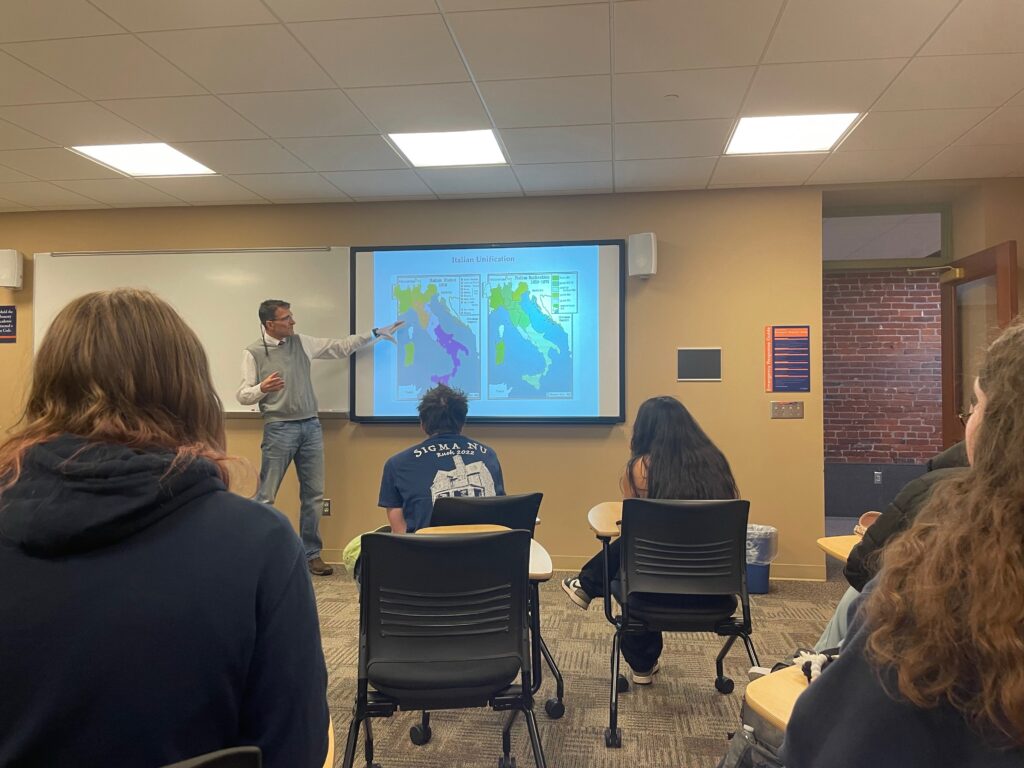Italian Club Hosts Lecture By Professor Perry
By Ella Prieto, Assistant News Editor

Professor Perry giving his lecture to the Italian Club (Photo Ella Prieto/The Gettysburgian)
On Wednesday, the Italian Club hosted a lecture by Italian Studies Professor Alan Perry entitled “Hey, Wait A Minute! What Makes an Italian an Italian?: Important Cultural Dimensions.” The event took place from 6 p.m. to 7 p.m. in Glatfelter Hall.
Perry began by describing how Italy was divided until the late 1800s. He identified four main players who helped unite the country: philosopher and politician Giuseppe Mazzini, shrewd political realist Count Benso Cavour, the first King of Italy King Victor Emanuel II and General Giuseppe Garibaldi.
He explained that despite the unification, Italians still primarily identify themselves with the regions or states they are from rather than their nation.
Perry showed the audience various clips that he felt helped to illustrate Italian culture. One was a San Pellegrino commercial, which spoke of how highly Italians value beauty and art, and the other was a FIAT advertisement where a FIAT car comes with an Italian family. The family then referenced Italian cultural aspects such as the pickiness of coffee and expressiveness.
“I think these are fascinating because they get into some of the cultural indices,” said Perry.
Perry then explained cultural indices, mentioning that the term was used by proponent of cross-cultural communication David Livermore and Dutch psychologist Geert Hofstede. The primary cultural indices of Italian culture conceptualized by Perry were identity, authority, rules, time, space and expressiveness.
Beginning with identity, Perry described how Italians are collectivists, particularly in the way that they think about their families before themselves. Moving into authority, Perry focused on the high power distance between professors and students in Italy.
“In Italy, I wouldn’t be dressed like this in front of you [students],” said Perry. “I’d never be in jeans as a professor. And you all would never be in shorts. You’d never be in sweats. You’d never be in open-toed shoes, and you’d come dressed pretty nicely to class, and you would give me the utmost respect.”
Following authority, Perry described the cultural index of rules as “guideposts” in Italy.
“[Laws and rules] are not definitive. You have to go on context,” explained Perry.
According to Perry, time is also not definitive in Italy, especially in social situations. The time to meet can vary by up to 45 minutes, and Italians do not find it rude. They also do not find the presence of minimal personal space rude, as most Italians stay only an elbow length apart from each other. Perry described how Italians are very touchy with those they interact with.
The last cultural index was expressiveness, as Perry stated that Italians tend to be very expressive and emotional.
“Generally, Italians are much more effusive. You can think about the way that they talk as well as with their incredibly developed hand-to-hand gestures, [a] way that they are emoting,” said Perry.
To exemplify this, Perry showed a Haagen Daz and a shaving commercial with Italians who were very expressive and emotional.
After explaining all of the cultural indices, Perry described other important Italian cultural values. These were fare bella figura, meaning outward appearances (which are very valued and used to make judgments); sprezzatura, meaning the ability to make one’s actions seem effortless or studied carelessness; and l’arte di arrangiarsi, meaning always making do or figuring out a solution.
He also mentioned that Italians are generally romantic and showed a Belgacom commercial that illustrated this.
Perry concluded with a disclaimer that all of the elements of his lecture were generalizations, but that they are thorough overviews of Italian culture. He also invited students who studied abroad in Italy to share their experiences with the culture and provide additional real-life examples for the audience.
